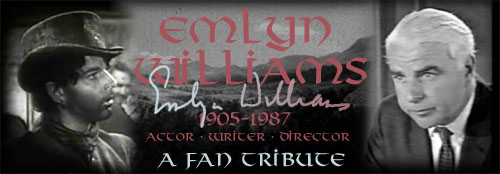

![]()
![]() actor/writer/director
George Emlyn Williams was born on November 26, 1905, in northeastern
Wales. He penned two autobiographies, a novel, a non-fiction investigation
into the shocking "Moors Murders" of the 1960s, in addition
to numerous plays, including Night Must Fall and The Corn Is
Green, both of which were made into successful films. He was a regular
on the London stage in roles like Richard III and Iago, and played
the leads in many of his own plays, but in his later career, he became
most identified with his one-man Charles Dickens show, with which he toured
the globe, making over 2,000 appearances in the role. He also created
and starred in one-man touring shows as Dylan Thomas and Saki.
His film roles were mostly character parts (and frequently villains),
but they were usually memorable. His appearances as Caligula in 1937's
uncompleted I, Claudius (completed scenes were later shown in the
1965 BBC documentary The Epic That Never Was); Harry the Pedlar
in 1939's Jamaica Inn (directed by Alfred Hitchcock); Joe Gowlan
in Carol Reed's adaptation of A. J. Cronin's The Stars Look Down;
Dennis in another Cronin adaptation, 1942's Hatter's Castle; and
Wamba in 1952's Ivanhoe were all scene stealers, as were his brief
but pivotal roles as Émile Zola in 1957's I Accuse and barrister
Sir Wilfred Falcett in 1959's The Wreck of the Mary Deare. It was
Williams who gave Richard Burton his first break into acting, casting
him in his stage play The Druid's Rest as well as the 1948 film
The Last Days of Dolwyn, which Williams wrote, directed, and starred
in. Burton remained close friends with Williams's son Brook, also an actor,
until his death. Emlyn Williams died in 1987.
actor/writer/director
George Emlyn Williams was born on November 26, 1905, in northeastern
Wales. He penned two autobiographies, a novel, a non-fiction investigation
into the shocking "Moors Murders" of the 1960s, in addition
to numerous plays, including Night Must Fall and The Corn Is
Green, both of which were made into successful films. He was a regular
on the London stage in roles like Richard III and Iago, and played
the leads in many of his own plays, but in his later career, he became
most identified with his one-man Charles Dickens show, with which he toured
the globe, making over 2,000 appearances in the role. He also created
and starred in one-man touring shows as Dylan Thomas and Saki.
His film roles were mostly character parts (and frequently villains),
but they were usually memorable. His appearances as Caligula in 1937's
uncompleted I, Claudius (completed scenes were later shown in the
1965 BBC documentary The Epic That Never Was); Harry the Pedlar
in 1939's Jamaica Inn (directed by Alfred Hitchcock); Joe Gowlan
in Carol Reed's adaptation of A. J. Cronin's The Stars Look Down;
Dennis in another Cronin adaptation, 1942's Hatter's Castle; and
Wamba in 1952's Ivanhoe were all scene stealers, as were his brief
but pivotal roles as Émile Zola in 1957's I Accuse and barrister
Sir Wilfred Falcett in 1959's The Wreck of the Mary Deare. It was
Williams who gave Richard Burton his first break into acting, casting
him in his stage play The Druid's Rest as well as the 1948 film
The Last Days of Dolwyn, which Williams wrote, directed, and starred
in. Burton remained close friends with Williams's son Brook, also an actor,
until his death. Emlyn Williams died in 1987.
copyright © 2006-2007 Susan D. Ciriello, all rights reserved
This bio is currently "under construction" while I read and try to summarize in my own words the thousands of pages of biographical information written about and by Emlyn Williams. In the meantime, please enjoy the rest of the site, including the video montage below; participate in the discussion on the forum; and stop back soon! And for more information about the life of Emlyn Williams, visit some of the other sites on the Links page.
text,
banner design, and site design
copyright © 2006-2007 Susan
D. Ciriello
all rights reserved
Celtic
clipart courtesy of
Bradley W. Schenk